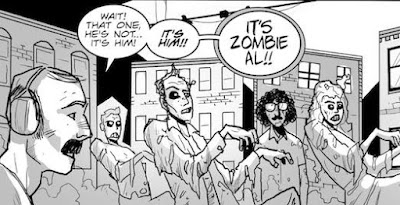In 1940, more than a year before the United States officially entered World War II, Jerry Siegel and Joe Shuster created a two-page Superman story for Look Magazine, titled "How Superman Would End the War". I had seen reproductions of the story a few times before, and it always fascinated me with how bold it was for the time it was published. I never thought I'd get a chance to even see the original magazine, let alone own a copy, but a few weeks ago, I somehow managed to purchase the issue in question from February 27, 1940.
The issue is oversized by today's standards, probably one and a half times larger than modern magazines. The copy I got is in pretty good shape, minus some stress to the spine. The colors on the cover are still bright and stark, in line with the photo coloring done in that time. The cover features Hollywood star Rita Hayworth shaking...maracas? Well, okay. In the top left, under the logo, Superman gets a blurb.
The "What it Means to be Neutral" article featured so prominently on the cover is a bunch of claptrap about why the US should leave Europe to its own devices and how the First World War didn't accomplish anything good, and I guess is a product of its time. The inclusion of a Superman comic that takes much the opposite stance makes it stand out all the more in a magazine that is mostly filled with puff pieces and large photo spreads.
Incredibly, the page before the comic has a short feature on both Jerry Siegel and Joe Shuster, something I'm sure National Comics (later DC Comics) would be disinclined to do. The features names Superman as a "new" character, which makes my head swim to think that it was ever the case. This was published fewer than two years after Superman showed up in Action Comics #1, so he was absolutely a new at this point. To put it in perspective, Batman was first published 11 months earlier in Detective Comics #27, Captain Marvel first showed up the very same month as this edition of Look Magazine, and Wonder Woman was still more than a year and a half away from existing.
The comic itself is only two pages long, but Siegel and Shuster, both Jews who were undoubtedly keenly aware of the atrocities happening across the Atlantic, pack it full of action, and it resonates emotionally, despite the odd juxtaposition of a fictional character with real-life despots.
Most of the magazine's interiors are black and white, but adding just one other shade to this story (an extra publishing expense) loans some depth to the story. Its placement almost makes the story seems as if it's published in full color.
Take a second to think about how incredible this page is - and how something similar would probably never be published today. Superman crashes into Hitler's secret headquarters, and then swoops into Moscow to grab Stalin as well, lugging them both to the League (League?) of Nations in Switzerland.
While much of America was still debating on whether or not to involve themselves in the war, Jews often were the most vocal about the need to intervene. The Three Stooges, for example, lampooned Hitler months before the bombing of Pearl Harbor.
I often wish that today's comics - specifically Marvel and DC - would take a more pronounced stand on social issues like they had in the past. That's not to say that there aren't still brave creators working for those large companies, but their corporate ownership has, naturally, watered down these voices in an attempt to remain as marketable as possible to broad audiences. But comics have a great history of standing up for those in trouble, and they can have a stronger impact than some may think. The above panel is just incredible!



























































































